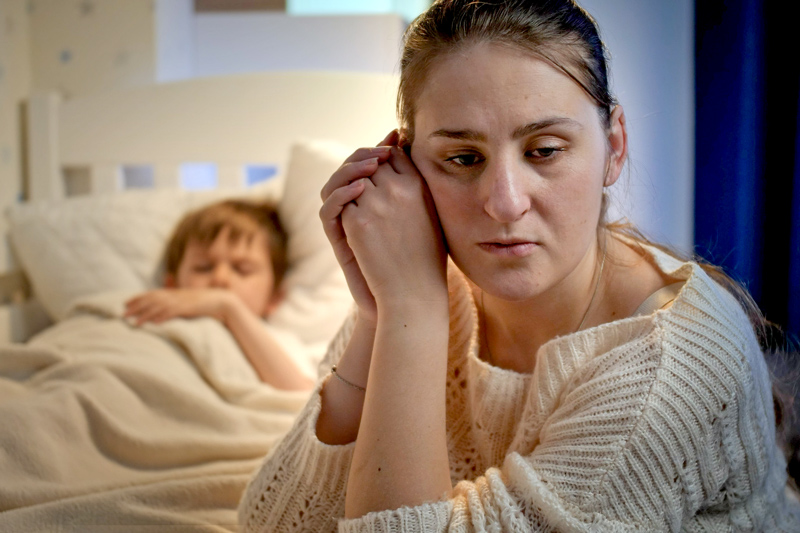Maternal mental health in the U.S. is in crisis. Despite advancements in medicine and growing awareness around mental health, the emotional well-being of mothers has quietly deteriorated. This is particularly true during pregnancy and after childbirth.

A recent study published in JAMA Internal Medicine reveals a nearly twofold increase in depressive symptoms among expectant and new mothers between 2014 and 2018, jumping from 10% to almost 20%. Behind these numbers lies a deeper story of chronic underinvestment in maternal mental health services, postpartum care, and family support infrastructure. This underinvestment comes from federal and state governments, healthcare systems, insurers, and workplaces that fail to provide paid leave or postpartum support.
As a physician who has spent decades working in behavioral health and telehealth services, I have witnessed firsthand how the lack of accessible mental health care creates cascading effects for families. There is an urgent need for comprehensive maternal mental health support that must be met.
Understanding the Postpartum Reality
To understand the urgency, it helps to step back and look at what the postpartum experience involves. Beyond sleepless nights and physical recovery, many mothers face a quiet reckoning: a reshaped identity, new emotional terrain, and the pressure to do it all with a smile. The early weeks and months after birth can be marked by exhaustion, loneliness, and anxiety. Some mothers experience intense mood swings, intrusive thoughts, or feelings of hopelessness and helplessness they are too afraid to name.
Despite this time of great need, many do not have access to mental health care, or do not know where to start. Even when they do speak up, they may be dismissed or told their suffering is simply part of the process. These emotional realities are common and often overlooked in standard medical care.
Mothers encounter significant barriers when seeking mental health care, particularly due to stigma. Studies show that as many as 58% of mothers who experience postpartum depression will not reach out for help, with many stating they were too scared to seek support. Additionally, social determinants like lack of transportation, affordable childcare, and time away from newborns further hinder access to necessary care.
The Broader Impact on American Families
This psychological toll has ripple effects far beyond individual households. The Centers for Disease Control and Prevention (CDC) recently reported that U.S. birth rates have dropped to their lowest levels ever recorded. While economic uncertainty and shifting cultural norms contribute to this trend, declining maternal mental health plays a powerful, often overlooked role. When potential parents witness how unsupported motherhood can feel, many hesitate to take that leap themselves.
Fear of facing postpartum depression alone, fear of being judged for struggling, or fear of losing themselves in the process can all shape the decision around whether to have children. These are not hypothetical fears. They are grounded in the lived experiences of millions of women. And when those experiences are ignored, the impact is felt across generations.
Evidence shows that treating maternal depression leads to measurably improved outcomes for children, including better growth and development patterns and reduced rates of illness. When mothers receive appropriate mental health interventions, the benefits extend beyond symptom relief to create tangible improvements in child health and development outcomes.
Building Solutions that Work
Addressing this crisis means building systems that go beyond simply responding to mental health emergencies, but preventing them in the first place. Healthcare organizations must fundamentally rethink how they approach maternal care by embedding mental health screening into routine visits from early pregnancy through the full postpartum year. This requires training OB/GYNs, pediatricians, and family physicians, among other licensed professionals, to identify early signs of distress and establish protocols for connecting mothers to specialized care, ensuring accessible therapy without stigma or long wait times.
The current approach treats newborns with tremendous care while often overlooking the emotional well-being of the parent during well-baby appointments. When healthcare systems integrate maternal mental health assessments into these visits and leverage telehealth platforms to eliminate barriers like transportation and childcare, mothers gain access to perinatal mental health specialists who can provide early intervention that makes recovery more likely and reduces long-term complications.
However, clinical solutions alone are insufficient without addressing the systemic pressures that leave mothers without support. Policy changes like expanding paid family leave and making childcare affordable, combined with healthcare systems that create seamless referral pathways between obstetric, pediatric, and behavioral health services, ensure no mother falls through the cracks.
Supporting maternal mental health requires reshaping how we care for mothers at every stage — before, during, and after birth. If we want to change the story, we must start by listening to mothers and building healthcare systems that are empathic, supportive, and accessible.
Dr. Tom Milam serves as Chief Medical Officer at Iris Telehealth and President of Iris Medical Group – guiding their team of clinicians in telemedicine and industry best practices. He received his undergraduate degree from WVU in Anthropology, where he graduated summa cum laude and Phi Beta Kappa. He went on to earn his Master of Divinity Degree from Yale, where he was a Yale’s Associate Scholar, followed by receiving his Doctorate of Medicine (MD) from the University of Virginia. His residency training in psychiatry took place at Duke and UVA. Dr. Milam has practiced in North Carolina and New Zealand and is an Associate Professor of Psychiatry and Behavioral Medicine at the Virginia Tech Carilion School of Medicine and Research Institute, where he has been on faculty for the last 15 years.
References
Centers for Disease Control and Prevention. U.S. Fertility Rate Drops to Another Historic Low. 2024.
Gohel, A. Best Care Practices for Mothers Experiencing Postpartum Depression. Iris Telehealth. March 27, 2023.
Postpartum Support International. Barriers to Mental Health Care Access Study. 2023.
Trends and Disparities in Maternal Self-Reported Mental and Physical Health. JAMA Internal Medicine. 2024.
World Health Organization. Mental Health, Brain Health and Substance Use: Maternal Mental Health.






